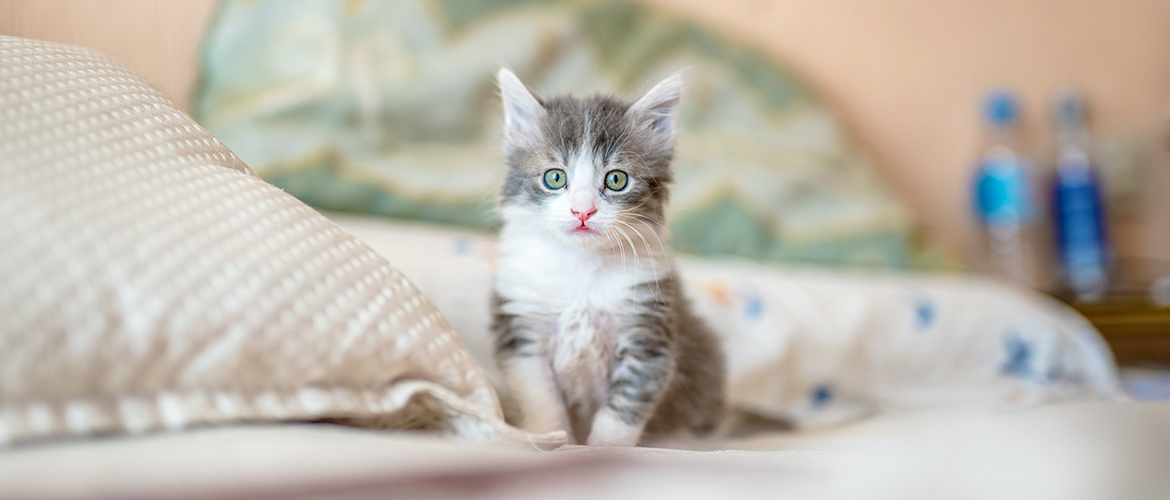Is Lavender Cat Safe?
Lavender—a shrubby perennial plant with lovely purple blooms that has entered our lives via herbal medicines, oils, skincare products, and wellness treatments—has become a popular herb. Lavender oil is one of the most widely used essential oils. But, is lavender cat safe?
Lavender, in particular the oil form, can be harmful to cats. It may help with stress and anxiety for humans, but lavender, especially in oil form, is dangerous to cats.
The lavender plant is a highly toxic shrub that can be fatal to cats. Here’s what you need to know about protecting your cat from lavender, including information on kinds of lavender, poisoning prevention and treatment options.
Is Lavender Cat Safe?
The American Society for the Prevention of Cruelty to Animals (ASPCA) states that lavender plants are poisonous to cats and can induce nausea and vomiting. “Lavender has linalool and linalyl acetate as well as enzymes that cats lack,” explains Dr. Rachel Barrack of Animal Acupuncture in New York City.
When it comes to lavender, the concern is not only the plant itself, but also its essential oil form, which has the highest toxicity levels, according to Barrack. “Oils are the most potent because they can be vaporized and inhaled or absorbed quickly through the skin resulting in acute toxicity.”
Cats are particularly sensitive to essential oils, and high doses of certain varieties can cause gastrointestinal upset, central nervous system depression, and even liver damage.
Types of Lavender and Cat Safety
Lavender plants are commonly seen in many homes across the United States, decorating windowsills, indoors spaces, and gardens. Lavender is available in the form of oils, sprays, and diffusers, among other things. The toxicity of all of these varies depending on how much a cat is exposed to them.
The lavender plant, according to Dr. Jamie Richardson of Small Door Veterinary in New York City, is not hazardous to cats unless they consume it. “Some cats even seem to enjoy sitting in or near outdoor lavender plants,” she says. “Most cats will not voluntarily ingest lavender plants, however on the off chance they do, they can cause gastrointestinal upset (usually vomiting).”
In other words, if your cat licks an ice cream cone or any other lavender plant but does not consume it entirely, she could become sick. This also applies to potpourri made from dried lavender spikes.
The most poisonous type of lavender for your feline is lavender essential oil. “Cats are more vulnerable to essential oils than other species because they lack a particular liver enzyme that aids in the metabolism of various medications, including essential oils,” adds Richardson. “Besides the dermal absorption that can occur rapidly, cats will often groom off foreign substances that have been applied to their coat, therefore, ingesting the oil.”
Although lavender oil diffusers and sprays have low amounts of lavender in them, they may still enter your cat’s respiratory system. According to Dr. Richardson, while there are few studies on the long-term consequences of essential oils for both people and animals, there is no clear evidence on how much is too much.
“We do know that cats can be extremely sensitive to even passive, diffused aerosolized products, leading to respiratory irritation in their lungs, causing asthma,” she says.
Cats can also get lavender poisoning by licking droplets from diffusers or sprays that have fallen on their coat. “Essential oils in active diffusers (where microdroplets are released into the environment) or sprays can fall onto a pet’s fur coat, where they can be absorbed through the skin or ingested during grooming,” warns Richardson.
Signs of Lavender Toxicity in Cats
According to Barrack and Richardson, signs of lavender toxicity in cats include, but are not limited to:
- Drooling
- Gastrointestinal signs such as vomiting and diarrhea
- Inappetance (refusal to eat)
- Lethargy
- Neurological signs such as staggering, stuporous or drunk like behavior, and tremors
- Decreased respiratory rate, asthma, or aspiration pneumonia
- Changes to heart rate/rhythm
- Liver failure
“There is no predetermined toxic dose for lavender oil,” says Richardson. “It is dependent on the sensitivity of each cat and manner of exposure.”
Within the first three hours of being exposed or ingesting catnip, your pet may begin to experience gastrointestinal issues. “Blood tests can show liver or kidney damage several days after symptoms appear,” according to Richardson.
According to Barrow, essential oils might induce aspiration pneumonia when breathed in. Pneumonia resulting from aspiration is an inflammation of the lungs as a result of inhaling non-respiratory foreign material. Regurgitation and vomiting are the most common causes, which also occur with lavender poisoning.
Causes of Lavender Poisoning in Cats
Your cat’s liver lacks particular enzymes that enable it to break down specific substances, such as essential oils and liquid potpourri.
The plant’s leaves, on the other hand, include linalyl acetate and linalool. These substances can cause stomach problems in cats. Even a diluted massage oil might produce an upset stomach, so keep your cat away from lavender plants or anything produced from lavender.
Every day, your cat requires attention, play times, and the opportunity to safely explore its surroundings. It will become bored if it doesn’t receive these privileges, putting it in risk of developing illness.
Diagnosis of Lavender Poisoning in Cats
Call the veterinarian even if your cat hasn’t shown any symptoms after ingesting some sort of lavender. If you suspect something has gotten into your potpourri or essential oils, don’t force-feed your pet to get it out. Because of the chemicals’ capacity to irritate the stomach and intestines, they can harm your pet’s digestive tract. Instead, stuff a sealed plastic bag with lavender, potpourri or essential oil and give it to your veterinarian for analysis.
Your cat will get a full physical examination, including a urinalysis and blood testing, from your veterinarian. If your cat has a sensitivity to lavender, he may experience adverse reactions, including internal bleeding. Lavenders are a type of allergen that can cause significant problems for cats with allergies or inflammations. The vet will examine your cat’s symptoms to see if they indicate liver or kidney damage.
How to Treat Lavender Poisoning in Cats
If you discover that your cat has come into touch with a lavender product, Richardson advises removing as much of the substance as feasible by bathing your pet. The police officer tells the woman that she should never feed it to her dogs, and they suggest contacting the ASPCA’s poison control hotline (888-426-4435) anytime of day for further information specific to the case. “They will be able to advise if you are safe to monitor your cat at home, or if you should get to your nearest vet ASAP, and the appropriate next steps that can be taken,” she says.
If your cat’s breathing changes, such as rapid breathing, coughing, and/or watery eyes after coming into contact with lavender oil/spray/diffuser, Richardson urges you to move the pet somewhere with fresh air and contact your veterinarian.
Bring your cat to a veterinarian if you suspect lavender poisoning based on the aforementioned symptoms. “A brief and thorough bath might enough if a few droplets come into contact with your pet,” says Barrack. However, if there is any more, or you detect indication of aspiration, ingestion, or your cat shows symptoms of lavender poisoning, contact your regular veterinarian immediately.
If your cat is exhibiting Lavender toxicity symptoms, she advises that a physical examination and possible hospitalization for blood samples and IV fluids might be required. Administration of medications may soothe the gastrointestinal upset and/or aid in the healing of the liver and kidneys, depending on the exam findings.
Recovery of Lavender Poisoning in Cats
Your kitty may recover from lavender poisoning if it receives veterinary treatment as soon as possible. It can come back from chemical burns that resulted after lapping up an essential oil or potpourri. It will recover from the injuries to its skin with the appropriate therapy if you massaged an essential oil into its skin thinking it would help it relax.
Remove all essential oils and potpourri items from your home before your cat arrives, or keep them in a place where he cannot get to them. Before you apply any essential oils on your cat’s fur, check with your veterinarian first.
If your cat ate from a lavender plant, remove it or put it somewhere where he can’t get to it. Instead, offer it the opportunity to nibble on “cat-friendly” grasses.
Lavender in Your Home: Protecting Your Cat
It’s appealing to distribute lavender throughout your home to provide a relaxing energy, but it may not be the greatest option for your feline companion. Here are some suggestions for keeping your house-cat safe from lavender toxicity.
Keep lavender out of reach of cats
Lavender should be kept out of reach of your cats, as fresh and dried lavender spikes may cause them to have an allergic reaction. Grow valerian, Cat’s Claw, and licorice root in a cat-friendly manner.
Lock up lavender oil and skin care products
If you use lavender oil or skincare products containing lavender, keep them in a secure cabinet that your cat can’t get into. Don’t allow your pet to lick the diffuser sticks or you after using any lavender skin lotions.
Avoid topicals containing lavender
It’s important for cat parents to avoid topical treatments that include lavender essential oils, according to Richardson. “Avoidance of applying topical essential oils, including lavender, to your pet is the best way to avoid toxicity,” she says.
Avoid lavender essential oils or sprays
Only cautiously use lavender-based diffusers or sprays, or avoid them completely. “I would recommend complete avoidance of essential oil active diffusers or sprays,” says Richardson.
Final Thoughts – Is Lavender Cat Safe?
In conclusion, lavender is not safe for cats, and cat parents should take care to keep their feline companions away from the plant and products containing lavender oil.
If your cat has been exposed to lavender, watch for symptoms of toxicity and contact your veterinarian immediately. With prompt treatment, your kitty should make a full recovery.





